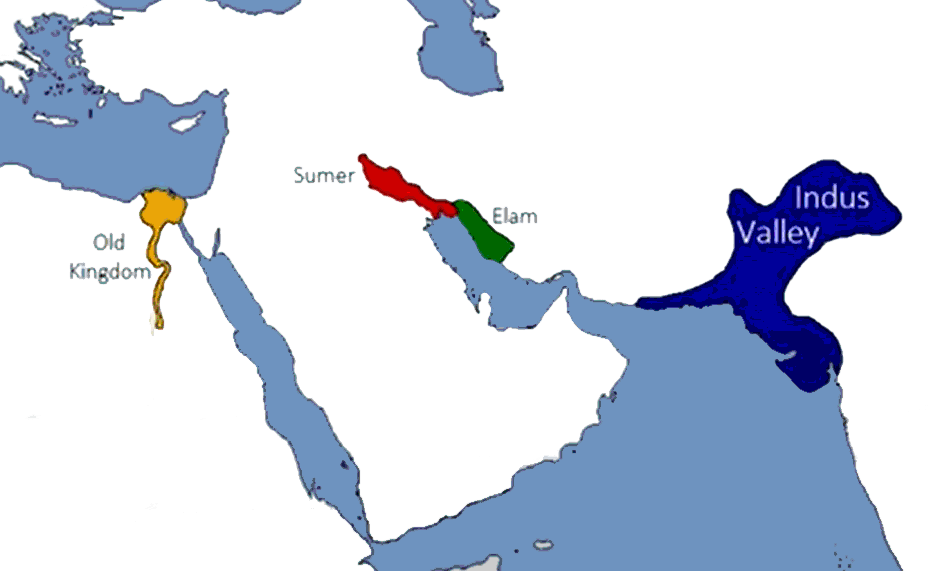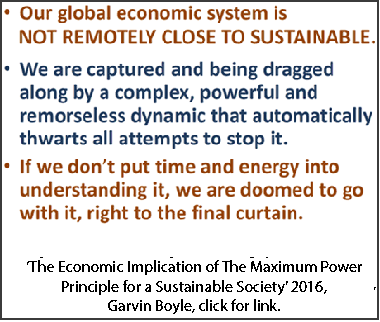
SATURDAY, SEPT 4, 2021: NOTE TO FILE

Could what happened to the Indus Valley Civilization happen to us?
History rhymes
Eric Lee, A-SOCIATED PRESS
TOPICS: OVERSHOOT, FROM THE WIRES, REMNANT POPULATION
Abstract: The Indus Valley civilization collapse went unnoticed by others in the ancient world. No literate Harappans survived to tell what had happened. Modern Techno-industrial global society could have a similar outcome.
COOS BAY (A-P) — This question is equivalent to asking, ‘why should I have ‘existential concerns’ for humanity and the biosphere?’
We don't know in any detail what happened, but that the Indus Valley Civilization had once existed was unknown to historians. That it had existed only became evident to archaeologists in the 1920s. A civilization that lasted 2,000 years, that flourished at the same time as Egypt and Mesopotamia (and Old Testament stuff), but more so, passed away and no one who continued to live in the Indus Valley remembered, beyond a few centuries, that it had once existed as the greatest of Bronze Age civilizations with hundreds of cities forming the world’s most complex society having up to 60,000 prosperous residents in each city. See Indus Valley Civilisation - Wikipedia

No one who could read the Harappan script they used passed on the knowledge of how to read it or much else. Some elements of Late Harappan religion may have survived within the minds of wandering monks who passed them on to become part of the vedic narratives of wordsmiths serving the then dominate Indo-European Aryan invaders (1500–1000 BCE) who entered India after most Harappan cities/towns had already been abandoned by 1700 BCE. The Aryans became the Brahmans of India for whom the Vedas were written.
Like the Indus Valley empire for whom there were no outlying empires to conquer them when they weakened, there are probably no Klingons who will come to fill the power vacuum we may create post-descent. Maybe the Vulcans will come instead. Or will there be a remnant ecolate human population (functioning complex society) who can do so?
Did the Indus Valley Civilization 'collapse', 'fall', or 'fade away'? Does it matter? If they had managed a prosperous descent, their language, knowledge, and culture would have persisted. All we know is that remnant populations persisted, but there was something approximating a 100 percent loss of memetic content and complex society (empire aka ‘civilization’). They left little more than ruins. Could something like that happen to us?
Per Wikipedia: 'Around 1900 BCE signs of a gradual decline began to emerge, and by around 1700 BCE most of the cities had been abandoned. Recent examination of human skeletons from the site of Harappa has demonstrated that the end of the Indus civilisation saw an increase in interpersonal violence and in infectious diseases like leprosy and tuberculosis. According to historian Upinder Singh, "the general picture presented by the late Harappan phase is one of a breakdown of urban networks and an expansion of rural ones."... there was a general decrease in long-distance trade.... Stone sculptures were deliberately vandalised, valuables were sometimes concealed in hoards, suggesting unrest, and the corpses of animals and even humans were left unburied in the streets and in abandoned buildings. During the later half of the 2nd millennium BCE [1500–1300 BCE], most of the post-urban Late Harappan settlements were abandoned altogether. Subsequent material culture was typically characterised by temporary occupation, "the campsites of a population which was nomadic and mainly pastoralist" and which used "crude handmade pottery."' Note: Downslope = 600 years and no literate Harappan survived.
 So, could something like this happen to us? Could we Anthropocene enthusiasts pass away, our existence evidenced by the ruins and stuff on the Moon and Mars we leave? Could our Anthropocene extinction event come to be marked by a layer of radioactive debris and microplastics in a geological layer named after us? Could we who live in what is now the first global civilization/empire (as only a vast planetary larder of fossil fuel could empower) come to dissipate as dissipative structures do? Will our silo science and technology save us? Or will it at least in part be the cause of our too complex society's failure as all prior complex societies have failed or ‘faded away’? Could systems science help us understand (and perhaps be delivered from) the remorseless dynamic we are captured and being dragged along by?
So, could something like this happen to us? Could we Anthropocene enthusiasts pass away, our existence evidenced by the ruins and stuff on the Moon and Mars we leave? Could our Anthropocene extinction event come to be marked by a layer of radioactive debris and microplastics in a geological layer named after us? Could we who live in what is now the first global civilization/empire (as only a vast planetary larder of fossil fuel could empower) come to dissipate as dissipative structures do? Will our silo science and technology save us? Or will it at least in part be the cause of our too complex society's failure as all prior complex societies have failed or ‘faded away’? Could systems science help us understand (and perhaps be delivered from) the remorseless dynamic we are captured and being dragged along by?
Such questions are of interest. Perhaps we have cause to be concerned for our continued corporate existence. But what percentage of humans (the 99+%) can, as true believers (likely everyone who read Eric Hoffer’s book ‘The True Believer’ thought they were not one of them), actually 'believe' that life as they know it might end for them or their children and/or their children's children?
About 22,000 colleges and universities require most students to take classes in economics, a subject some get Nobel Prizes for ‘advancing’. About 7+K graduate with PhD degrees in neoclassical economics each year (far more than get PhDs in Astrology, vedic of course, from universities in India) so they can serve the growth hegemon (like just about everybody else who makes money) to help grow the economy.
I'd guess something close to zero (<0.1%) of us have existential concerns strong enough to do more than mouth off when drunk. Otherwise we Anthropocene enthusiasts would not be able to serve with enthusiasm and prosper (make money by laboring, teaching, designing, inventing, manufacturing, informing, protecting, serving…), and that goes for ecomodernists, journalists, educators, politicians/voters, religious leaders/followers, professors of sustainability studies, bloggers, CEO/NGO leaders, those who update Facebook or serve in the military, government, or on police forces... and any other professions or avocations (like updating Quora or Facebook) you can name.
Can all these fine upstanding citizens be wrong? I'd guess that up to about 1900 BCE, no Harappans who thought they knew enough to have an opinion (or wanted others to think they did) foresaw any future other than continued progress and prosperity (or admitted to having concerns if they had any). How many, then or now, would wonder or want to know about 'a prosperous way down' or 'a prosperity of enough during rapid degrowth'?
I estimate, based on an ongoing citizen science project, that maybe 0.01% of humans actually think (or can think) that the economic, social, political, religious, and educational control systems they are a product of and serve, think that the SYSTEM they are part of IS NOT REMOTELY SUSTAINABLE. The global economy is still growing. When it isn't, when actual degrowth sets in, the percentage of those actually concerned enough to actually do something alternative to BAU (business-as-usual), like 'vote with their feet', could increase to 0.1% or even 1.0% But I'm an optimist, so maybe not. We'll see (or posterity will).
We are not doomed to repeat the Indus Valley trajectory because, seen through the macroscope of systems science, we can understand it and thereby be delivered from it. We could learn from the Harappans and hundreds of others. Foresight intelligence, possessed even by as little as 0.1%, could preserve pockets of a viable civilization able to select for functional humans able to prepare information packages for posterity about how to understand and live properly with the planet. Some, as many as can learn to just say no to empire-building and short-term self interests, may act such that future bottlenecks do not arise, ones that we may fail to manage to pass through. If only 'survivalist' types having the most ammo end up inheriting the rubble, we will, after perhaps a thousand years of environmental restoration, repeat the pattern. Alternative would be to consider a Design for a Viable Civilization
Perhaps enough humans will get foresight smart and become Federation. We live in interesting times. May the Force of Thinking in Systems be with us.
You can't join the compassionate revolution, but you can be a compassionate ℞evolutionary. We really need prescriptions for our continued evolution.
